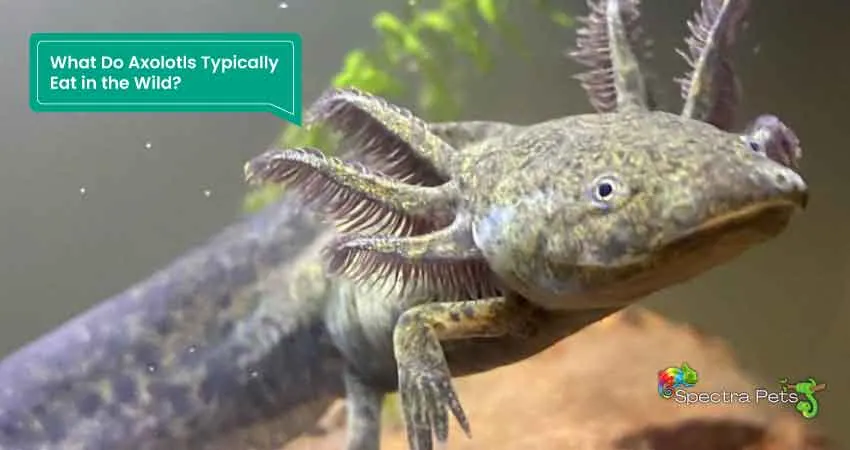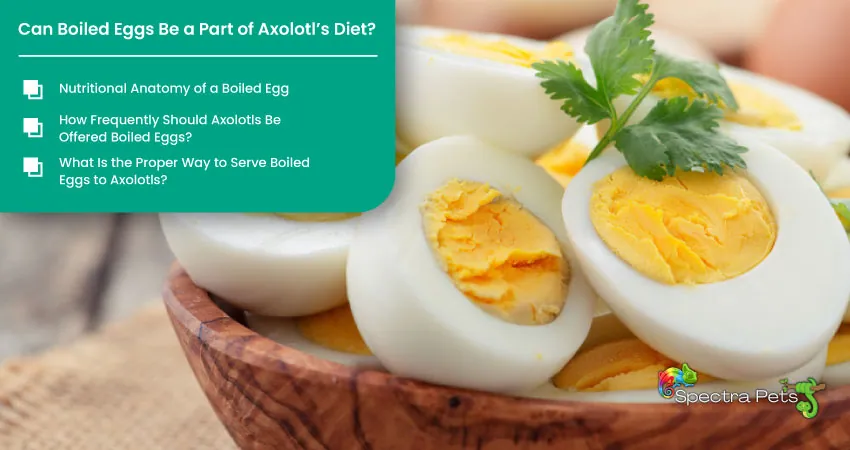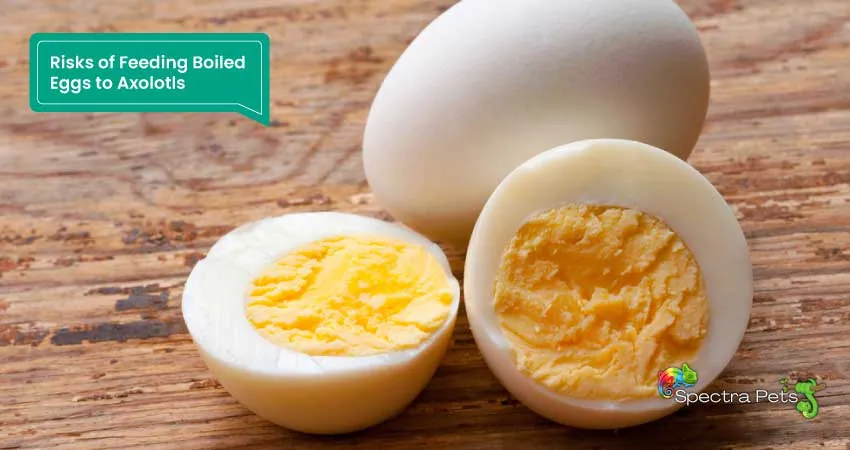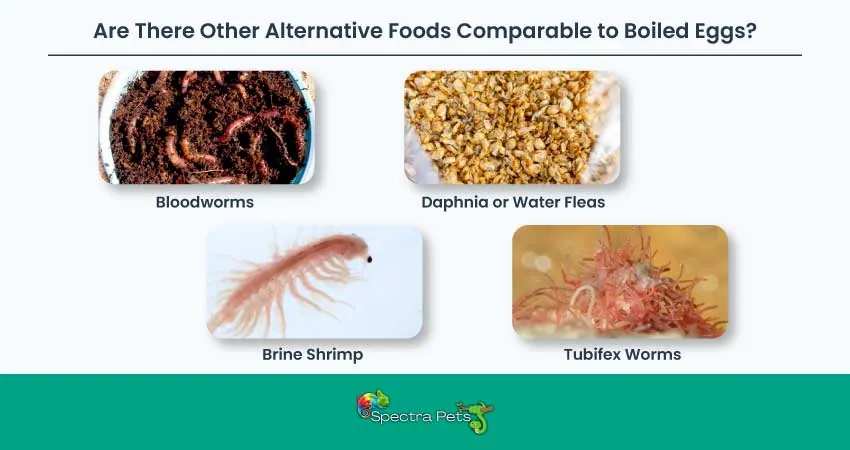Amphibians, much like their land-dwelling counterparts, often benefit from diverse diets that mirror their natural habitats. It’s not uncommon for pet owners to contemplate boiled eggs as a supplementary food source. After all, eggs are renowned for being nutrient-rich powerhouses, particularly suited for young, growing animals. Packed with protein and brimming with essential nutrients, they promise both health and growth benefits. But when it comes to axolotls, the famed Ambystoma mexicanum from Mexico’s ancient lakes, does the same rule apply?
So, can axolotls eat boiled eggs? Yes, they can. Boiled eggs, primarily the egg whites, can be an occasional treat for axolotls, offering proteins and essential vitamins. Yet, it’s crucial to serve such treats in moderation to ensure their overall health remains intact.
As you navigate through this article, you’ll uncover detailed insights into axolotls’ dietary habits, the intricacies of feeding them boiled eggs, and the proper protocols to adhere to. We’ll also delve into how to respond to potential dietary mishaps, arming you with knowledge for optimal axolotl care.
What Do Axolotls Typically Eat in the Wild?

Nature’s design has equipped axolotls to be voracious hunters within their aquatic habitats.
The pristine, chilly waters of Xochimilco lake complex near Mexico City are where axolotls reign. These waters are not just their homes but also their hunting grounds.
Detailed Diet Breakdown:
| Food Source | Percentage in Diet | Nutritional Value |
|---|---|---|
| Aquatic Insects | 60% | High protein, Vitamins A & D, Essential fats |
| Small Fish | 25% | Omega-3 fatty acids, High protein |
| Worms | 15% | Fiber, Protein, B vitamins |
- Aquatic Insects: Comprising a lion’s share of their diet, these include larvae of mosquitoes, dragonflies, and other small insects. Due to their abundance and easy availability, they are a go-to food source. Research in the Journal of Aquatic Insect Behaviors noted that axolotls showed an increased hunting fervor when in the vicinity of aquatic insect swarms.
- Small Fish: Though not their primary food source, axolotls do indulge in hunting smaller fish like mosquito fish or baby mollies. It’s a game of stealth and speed, one that axolotls excel in due to their evolution.
- Worms: Earthworms, with their wriggling motion, attract axolotls like magnets. But it’s not just the motion; these worms are nutritionally rich. They’re packed with essential vitamins, making them the perfect snack.
Axolotl’s carnivorous diet in the wild reflects their active hunting nature. The complexity of their natural environment means they need a high-protein diet to sustain their energy levels.
Can Boiled Eggs Be a Part of Axolotl’s Diet?

Boiled eggs: universally loved by many creatures, but are they suited for axolotls?
Nutritional Anatomy of a Boiled Egg:
| Component | Percentage | Health Benefits |
|---|---|---|
| Protein | 12.5% | Essential for tissue repair and muscle growth |
| Fats | 10.6% | Provides energy and supports cell growth |
| Vitamins & Minerals | Trace | Vital for overall health and metabolic processes |
- Protein Rich: The white part of boiled eggs, albumen, is rich in protein. This protein can provide essential amino acids that might be beneficial for axolotls, especially if other protein sources are temporarily unavailable.
- Vitamin Treasure: Boiled eggs come loaded with vitamins like A, B12, and D. These vitamins can support axolotl’s metabolic processes, ensuring they stay energetic.
- Fat Alert: The yolk, though rich in essential fats, might be a tad too much for axolotls. Their natural diet doesn’t have such a high-fat content, and thus, it can be challenging for them to digest it.
Boiled eggs, especially the white part, can be a good supplement, but they shouldn’t be the main course. Axolotls might not be able to handle the fat content in yolks. If you’re considering this, moderation is essential.
Precautions:
- Always ensure the egg is boiled thoroughly.
- Avoid the yolk or give it very occasionally.
- Observe your axolotl after feeding. If there are any signs of distress, consider consulting a vet.
How Frequently Should Axolotls Be Offered Boiled Eggs?
Feeding axolotls, particularly their dietary frequency and diversity, is a topic that has generated much discussion among amphibian enthusiasts and researchers. Let’s break down how often axolotls should be offered boiled eggs:
1. Age and Growth Stage of the Axolotl:
- Juveniles (up to 6 months old): Axolotls in this growth phase require nutrient-dense foods frequently to support rapid growth and development. While live food items like brine shrimp and daphnia are more commonly recommended, you can offer boiled egg yolk to these young axolotls once a week as a supplementary treat. It ensures they receive the essential nutrients found in egg yolk, which aids their growth.
- Sub-adults (6-12 months old): Their growth slows down slightly during this phase. Introduce a more varied diet including worms, but boiled egg yolk can still be offered once in 10 days or fortnightly.
- Adults (over 12 months): Adult axolotls have reached their full size, and their dietary requirements aren’t as stringent. Offering boiled eggs to adults should be limited to once or twice a month, and it should be more of a treat than a dietary staple.
Related Article: Axolotl Growth Stages
2. Nutritional Balance:
It’s essential to note that while boiled eggs, especially the yolk, are nutrient-rich, they shouldn’t replace the primary diet of axolotls. The protein and nutrient content in eggs can lead to rapid growth, but an exclusively egg-based diet can cause nutritional imbalances in the long run. For optimal health, axolotls need a varied diet, including live food items that stimulate their natural hunting instincts.
3. Observation and Adjustments:
Always observe your axolotl’s reaction to any new food introduced, boiled eggs included. If you notice any signs of distress, discomfort, or digestive issues, it might be wise to cut back on the frequency or eliminate eggs from their diet. Regularly monitor their weight and growth, and adjust feeding frequencies accordingly.
What Is the Proper Way to Serve Boiled Eggs to Axolotls?
Ensuring that your axolotl gets the best nutrition without compromising its health means not just selecting the right food, but also serving it appropriately. Boiled eggs, given their consistency and content, require a bit of preparation before being offered to axolotls. Here’s a step-by-step guide:
1. Boiling the Egg:
- Start with a fresh egg. Place it in a pot with enough water to cover it entirely.
- Bring the water to a boil and let the egg cook for about 10-12 minutes to ensure it’s fully boiled.
- Once done, transfer the egg into a bowl of cold water. This makes peeling easier and stops any residual cooking.
2. Preparing the Egg for Your Axolotl:
- Once cooled, peel the eggshell off completely.
- For juvenile axolotls, focus on the yolk. It’s softer and packed with nutrients ideal for their growth. Gently separate the yolk from the white.
- For adult axolotls, you can use both the yolk and the white, but it’s advisable to offer them in separate feedings to prevent overfeeding.
3. Serving Size and Portioning:
- A small portion goes a long way. For juveniles, a pinch of the yolk suffices. For adults, a small piece of the egg white or yolk, roughly the size of their head, is adequate.
- If you’re using both the white and the yolk for adult axolotls, ensure you space out the feedings.
4. Offering the Egg:
- Use feeding tongs or your fingers to offer the egg portion to your axolotl. This ensures that you can control the portion size and remove any uneaten remnants easily.
- Gently move the egg piece in the water to get the axolotl’s attention.
5. Post Feeding Cleanup:
- It’s crucial to maintain water quality. After feeding, remove any uneaten egg parts from the tank immediately to prevent water contamination.
- Monitor your axolotl for any unusual behavior post feeding. While unlikely, any signs of distress should prompt a review of their diet.
6. Storing Leftover Eggs:
- If you don’t use the entire boiled egg, it can be stored in a sealed container in the refrigerator for up to 3 days. Ensure you bring it to room temperature or warm it slightly in water before feeding it to your axolotl in subsequent sessions.
Related Article: What To Feed Juvenile Axolotls?
Risks of Feeding Boiled Eggs to Axolotls

While boiled eggs can serve as an occasional treat and offer some beneficial nutrients to axolotls, frequent or inappropriate feeding can pose several risks. Let’s delve into some of these potential pitfalls to ensure that axolotl caretakers are well-informed and can make the best dietary choices for their pets.
1. Nutritional Imbalance:
- Protein Overload: Eggs are protein-rich, and while axolotls need protein, overconsumption can lead to health issues. An excessively high-protein diet can strain their kidneys and lead to organ damage over time.
- Lack of Essential Nutrients: Relying too heavily on eggs can mean axolotls miss out on other crucial nutrients available in a diverse diet, like specific vitamins, minerals, and fatty acids found in their primary food sources.
2. Digestive Issues:
- Choking Hazard: If the egg pieces are too large, especially the tougher white portion, axolotls can struggle to swallow and may choke. Always ensure the portions are appropriately sized for the age and size of the axolotl.
- Constipation: Overfeeding boiled eggs, particularly the white part, might lead to constipation in axolotls. Observing their behavior post feeding is vital to catch any signs of distress or discomfort.
3. Water Contamination:
- Decomposing Egg Remnants: Any leftover egg bits can decompose in the water, leading to spikes in ammonia and nitrite levels. This not only affects water clarity but can be toxic for axolotls.
- Altered pH Levels: Decomposing organic matter, like uneaten eggs, can lead to a drop in pH levels. This change in water chemistry can stress axolotls and make them more susceptible to diseases.
4. Habituation and Dependency:
- Reluctance for Other Foods: Axolotls might develop a preference for eggs if fed too frequently, leading them to become fussy eaters and reject their standard foods.
- Lack of Natural Instincts: In the wild, axolotls are predators. Constantly feeding them easy-to-consume foods like eggs might dull their hunting instincts.
5. Potential for Obesity:
- Caloric Intake: Eggs are calorie-dense. Overfeeding can lead to obesity in axolotls, which can further lead to a host of other health issues, including organ strain and reduced mobility.
To avoid these risks, it’s imperative to approach feeding boiled eggs to axolotls with caution, ensuring it remains an occasional treat rather than a primary food source. Observing the axolotl’s health, behavior, and water quality will help in adjusting their diet for their best well-being.
Are There Other Alternative Foods Comparable to Boiled Eggs?

For those considering diversifying their axolotl’s diet, there are alternatives to boiled eggs that provide comparable nutritional value.
- Bloodworms: High in protein and readily accepted by most axolotls, they’re a favorite. They also contain essential amino acids beneficial for health.
- Daphnia or Water Fleas: These tiny crustaceans are rich in proteins and essential fatty acids, making them a nutritional powerhouse.
- Brine Shrimp: Another protein-rich food, they also offer essential fatty acids. They can be a treat axolotls love chasing around.
- Tubifex Worms: While rich in protein, they should be given in moderation due to their potential to carry parasites.
Conclusion
While boiled eggs can be a beneficial supplement to an axolotl’s diet, especially the yolk for young axolotls, moderation is crucial. Strive to maintain a balanced diet that mirrors their natural dietary habits in the wild, sprinkling in boiled eggs as an occasional treat.
Caring for axolotls is a rewarding experience, but it comes with the responsibility of understanding their needs deeply. Being informed and vigilant ensures these majestic creatures lead a healthy, happy life.
